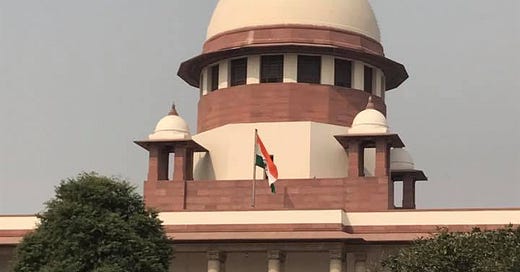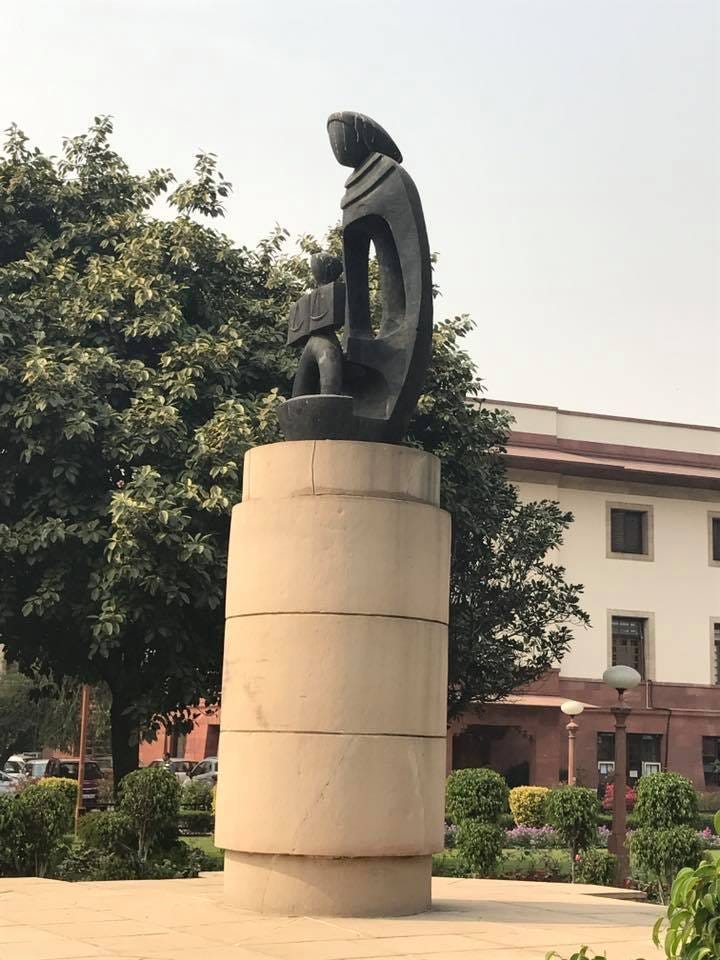Supreme Court Strikes Down Domicile-Based Reservations in PG Medical Courses
Dawn of 'One Nation-One Domicile' Principle: "There is nothing like a provincial or state domicile. There is only one domicile. We are all residents of India', rules Supreme Court.
Supreme Court Strikes Down Domicile-Based Reservations
In a far-reaching judgment, the Supreme Court of India ruled on January 29, 2025, that domicile-based reservations in postgraduate (PG) medical courses are impermissible and declared them unconstitutional for violating Article 14 of the Constitution. This landmark verdict marks the dawn of the "One Nation, One Domicile" principle, reinforcing the idea that Indian citizenship comprises a single, unified class where all citizens are treated equally under the Constitution.
The Court indirectly indicated observed that preferential treatment based on domicile, granted by various states, had fueled “sons of the soil” claims, deepening regional divides and fragmenting the polity of a nation that has traditionally prided itself on "Unity in Diversity." In many instances, this had gone so far as to effectively create sub-classes of Indian citizenship, an untenable proposition under the Constitution, which upholds one uniform class of citizens with equal rights and opportunities across the country.
A three-judge bench, comprising Justices Hrishikesh Roy, Sudhanshu Dhulia, and SVN Bhatti, ruled that state quota seats for PG medical courses must be allocated solely on merit, as determined by the National Eligibility cum Entrance Test (NEET-PG). The verdict arose from appeals challenging a Punjab and Haryana High Court ruling, which had previously struck down domicile-based reservations at Government Medical College and Hospital, Chandigarh. The case, Tanvi Behl v. Shrey Goel & Ors, was referred to a larger bench in 2019 for an authoritative ruling on the constitutionality of such reservations.
The Court categorically stated:
"Residence-based reservation in PG medical courses is violative of Article 14 of the Constitution."
It further emphasised:
"We are all domiciles in the territory of India. There is nothing like a provincial or state domicile. There is only one domicile. We are all residents of India. We have the right to choose residence anywhere in India and to carry out trade and profession anywhere in the country. The Constitution also gives us the right to choose admission in educational institutions across India."
While striking down domicile reservations for future admissions, the apex court clarified that the judgment would not affect students who have already been granted domicile-based reservations.
This verdict arose from appeals challenging a Punjab and Haryana High Court ruling, which had previously declared domicile-based reservations in PG medical admissions unconstitutional.
Background: The Evolution of Reservation Policies
The Supreme Court’s January 29, 2025, judgment marks a turning point in India’s approach to reservations in medical education. This decision reflects a shift towards meritocracy, raising important questions about the role of domicile, affirmative action, and equality in educational and employment policies.
India’s constitutional reservation framework aims to strike a balance between ensuring equal opportunity and providing affirmative action for historically disadvantaged communities. However, domicile-based reservations, which benefit residents of a particular state, have increasingly come under legal scrutiny.
Constitutional Framework of Reservations
Equality vs. Affirmative Action
The Indian Constitution guarantees equality while permitting affirmative action for certain disadvantaged groups. The key provisions include:
Article 14: Guarantees equality before the law and prohibits arbitrary discrimination.
Article 15(4) & 15(5): Allow the State to make special provisions for socially and educationally backward classes, including Scheduled Castes (SCs) and Scheduled Tribes (STs), in educational institutions.
Article 16(4): Permits reservations in public employment for backward classes inadequately represented in government services.
However, domicile-based reservations do not fall within these explicit constitutional provisions and have faced challenges on the grounds of equality and reasonableness.
Key Findings of the Supreme Court Judgment
1. Domicile-Based Reservations Violate Article 14
The Supreme Court ruled that domicile-based reservations create an unreasonable classification based on place of residence, violating Article 14, which guarantees equal access to education across India.
2. Merit-Based Admissions in PG Medical Courses
The Court affirmed that state quota seats in PG medical colleges must be filled based solely on merit, as determined by NEET-PG scores. This ensures a standardised and transparent admission process.
3. The Concept of One Domicile
The judgment reaffirmed that India has a single domicile—that of the entire country. The notion of state-wise or provincial domicile has no constitutional validity when it comes to educational opportunities.
4. Distinction Between UG and PG Medical Courses
The Court differentiated between undergraduate (MBBS) and postgraduate (PG) medical admissions. While some domicile-based reservations may be justified at the UG level, they were deemed impermissible at the PG level, given the specialised nature of medical education.
Implications of the Judgment
1. Impact on Future PG Medical Admissions
The ruling immediately applies to future PG medical admissions across states, ensuring a merit-based selection system.
2. Protection for Existing Students
The judgment does not affect students who have already availed domicile-based reservations for their PG medical studies.
3. Policy Re-evaluation by States
States must now revise their admission policies to align with this landmark ruling, setting a strong precedent against domicile-based reservations in higher education.
4. Broader Implications for Reservation Policies
The ruling could also trigger legal challenges against domicile-based quotas in other professional courses and government employment. It strengthens the argument that reservations should be based on backwardness and representation, rather than residence-based classifications.
Reservations for Special Categories: Beyond Article 16(4)
While SC, ST, OBC, and EWS reservations are explicitly recognised under Articles 15(4), 15(5), and 16(4), many states also grant reservations to:
Ex-servicemen and their dependents
Sportspersons
Descendants of freedom fighters
These special category reservations do not fall under Article 16(4) but derive validity from Article 16(1), which provides for equality of opportunity in public employment. Courts have upheld that Article 16(4) is not exhaustive, allowing reasonable classifications under Article 16(1).
Judicial Precedents and Limitations
Sports Quota – The Uttarakhand High Court upheld sports category reservations as valid under Article 16(1), as they promote excellence in sports.
Descendants of Freedom Fighters – Some states provide reservations to children and grandchildren of freedom fighters, though courts have questioned their modern-day relevance.
Ex-servicemen – The Ministry of Defence and DoPT provide guidelines for ex-servicemen quotas, typically justified on grounds of national service.
However, these reservations face legal scrutiny:
50% Ceiling – The Supreme Court’s 50% cap on total reservations applies unless there are extraordinary circumstances.
Reasonable Classification – Any reservation must pass the test of reasonableness under Article 14.
Judicial Review – These quotas remain subject to scrutiny to prevent arbitrary expansion.
State Authority on Language Proficiency Requirements
Language Proficiency for Government Jobs
Many states mandate regional language proficiency for government jobs, which has been upheld as constitutional under Article 345. States like Tamil Nadu, Karnataka, West Bengal, Punjab, and Assam have enforced such requirements.
However, such policies must be:
Clearly mentioned in recruitment notifications
Applied uniformly and not arbitrary
Relevant to the job profile
Can Language Proficiency Be Made Mandatory for PG Medical Courses?
The Supreme Court’s emphasis on merit-based PG medical admissions suggests that a strict language requirement may face legal challenges.
Concerns include:
Medical Standards – PG courses require access to global medical literature, which is predominantly in English.
Mobility of Professionals – Rigid language barriers could hinder doctors from moving between states.
Quality of Healthcare – Language requirements must not compromise medical training.
Conclusion
The Supreme Court’s ruling striking down domicile-based reservations in PG medical admissions is a landmark verdict that reinforces the constitutional ideal of “One Nation, One Domicile.” It decisively ends state-imposed barriers to educational opportunities based on residence, upholding the principle that all Indian citizens belong to a single, undivided class. The judgment not only strengthens equality of opportunity but also serves as a safeguard against the fragmentation of Indian polity, where "sons of the soil" policies have long threatened the nation's Unity in Diversity.
By firmly placing merit at the centre of postgraduate medical admissions, the ruling ensures that medical education maintains the highest standards, producing specialists based solely on competence rather than regional affiliations. It also sends a clear message that constitutional guarantees of equal opportunity cannot be diluted by state-specific policies that undermine national unity.
However, while the PG level has been settled conclusively, the issue remains a grey area at the UG level. There, domicile and language proficiency requirements may still be considered, particularly for promoting regional integration and helping local students pursue foundational medical training in their native language. The constitutional status of such provisions remains uncertain, and future legal challenges may further define the permissible limits of domicile-based preferences at the undergraduate level.
What is now beyond doubt is that at the postgraduate level, neither domicile nor regional language proficiency can be a barrier to admission. States can no longer use linguistic or residential requirements to restrict access to advanced medical education. The Supreme Court has thus ensured that India’s most specialised doctors will be selected solely on merit, without artificial restrictions based on residence or language proficiency.
As India transitions to a more merit-driven and nationally integrated education system, this ruling will undoubtedly reshape the debate on reservations in professional education and beyond. It lays down a precedent that prioritises ability over arbitrary classifications, ensuring that reservation policies remain constitutionally sound, nationally unifying, and globally competitive.
Here are the clickable links extracted from the citations in the article:
These clickable sources provide direct access to the latest reports and legal analysis on the Supreme Court's verdict on domicile-based reservations in PG medical admissions.






On no other platform we get such quick and quality analysis.